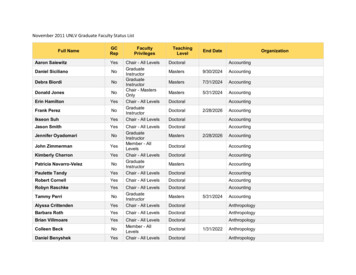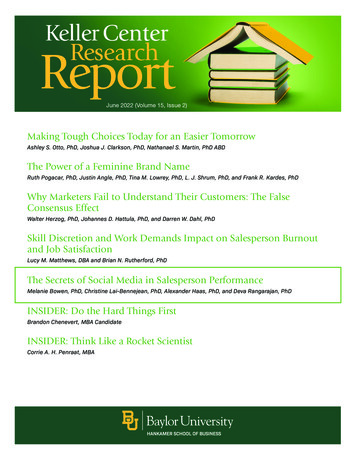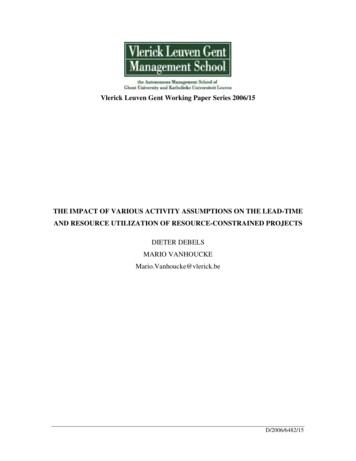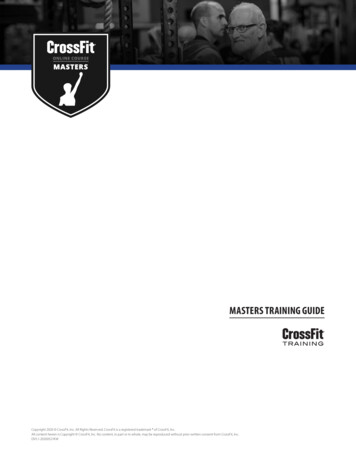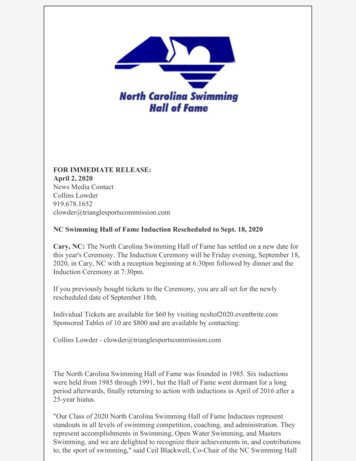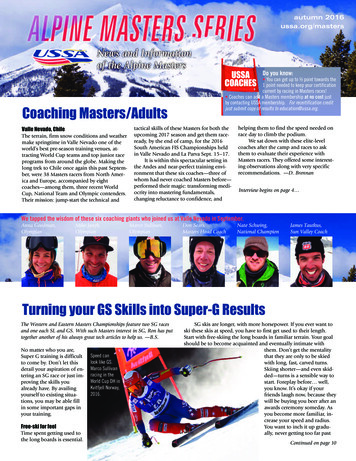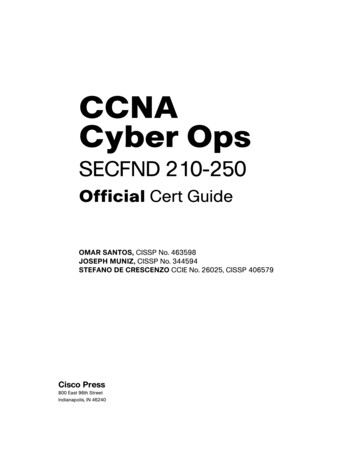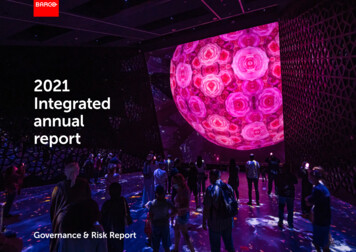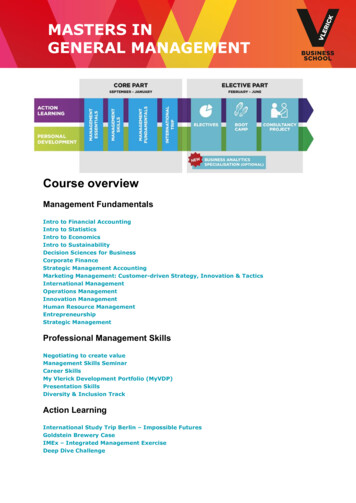
Transcription
MASTERS INGENERAL MANAGEMENTCourse overviewManagement FundamentalsIntro to Financial AccountingIntro to StatisticsIntro to EconomicsIntro to SustainabilityDecision Sciences for BusinessCorporate FinanceStrategic Management AccountingMarketing Management: Customer-driven Strategy, Innovation & TacticsInternational ManagementOperations ManagementInnovation ManagementHuman Resource ManagementEntrepreneurshipStrategic ManagementProfessional Management SkillsNegotiating to create valueManagement Skills SeminarCareer SkillsMy Vlerick Development Portfolio (MyVDP)Presentation SkillsDiversity & Inclusion TrackAction LearningInternational Study Trip Berlin – Impossible FuturesGoldstein Brewery CaseIMEx – Integrated Management ExerciseDeep Dive Challenge
Finance and Accounting Simulation Tool (FAST)Consultancy ProjectElectivesChoose any 4. The electives can take place in Ghent (G), Leuven (L) or Brussels (B)(please note that the locations can be subject to change)Advanced Corporate Finance (G)Advanced Strategy (B)Applied fundamentals of AI (L)Business Development & Sales (G)Data-driven Project Management (G)Data management & Cloud Platforms (L)Data Science with Python (L)Digital Innovation & Entrepreneurship (L)Gaming & Esports (G)Leadership Skills in an Agile World (G)Family Business (G)Managing Risk to Maximise Opportunity (B)Mergers and Acquisitions (B)Organisational Design: Turning Strategy into Organisational Structuring (B)Social Entrepreneurship (L)Strategy Beyond Markets (B)Strategy Implementation and Change (B)Strategic Information Management (L)Sustainable Growth Strategies - The European Green Deal (B)The Leader as Negotiator (L)Turning Supply Chain Management into a Competitive Advantage (G)Boot campsCode Camp: Programming for BusinessData Science for Finance and StrategyDigital TransformationGlobal Supply Chain StrategyStrategic Innovation: FinTechStrategic Innovation: HealthcareStrategic Innovation: Renewable EnergyStrategic Innovation: Retail & Marketing of FMCGStrategy ConsultingSports Business & Digital Innovation
Management FundamentalsIntro to Financial AccountingWhat? Understand the meaning and relevance of key concepts in accounting Develop the skills needed to analyse and interpret financial reports or financial statementsin an international context.How? By discussing practical examples and real-world applicationsThrough formative assignments and online exercises with immediate feedback (MyLabAccounting)Course holder: Prof Dr Kristof StouthuysenIntro to StatisticsWhat? How? Summarize data into meaningful information needed to feed business decision-makingCalculate the likelihood of an event happeningUnderstand why sampling is necessary to make inferences about the populationThrough blended learning via our digital learning environment, to allow you to learn atyour own pace at home while reserving class time for applications and discussionsThrough a dataset of the Delhaize retail store which lists data from customers on theirshop visit behaviourThrough an optional MS Excel training to sharpen your spreadsheet skills, which will becrucial when discussing data analysisCourse holder: Prof Dr Brecht CardoenIntro to EconomicsWhat? How? Understand the meaning of economics and economic systems, and how economicsinfluences all stakeholders in societybe able to determine their influence on the future performance of a country, organization,managerUnderstand the behaviour of consumers and firms in a modern economyUnderstand how and why economic policy decisions are made based on the above anddetermine the impact of such decisions on the managerial functionBy discussing practical examples, through engaging in formal and informal debates anddiscussionsThrough continuous encouragement to make informed decisions, based on the processingand integration of credible information and knowledge
Course holder: Prof Dr André RouxIntro to SustainabilityWhat? How? Discuss, explore and clarify the content, meaning and different dimensions of (strategic)CSRHow can CSR be integrated in different management disciplines such as performancemanagement, reporting, HRM, supply chain management, marketing, etc.By discussing and explaining how and to what extent CSR can lead to innovation inproducts and servicesBy inviting and debating with stakeholders of management and engagementCourse holder: Prof Dr Xavier BaetenDecision Sciences for BusinessWhat? Identify which business problems are amendable for modellingDevelop technical models to solve real business problemsGain insights into the use of modelling software toolsCreate understanding in problem analyticsHow? By solving small exercises or case studiesThrough case study discussions of practical business cases (e.g. Brussels Airlines,University Hospital)Through simulation of an assigned case study exerciseBy critically reviewing popular decision-support methodologiesCourse holder: Prof Dr Mario VanhouckeCorporate FinanceWhat? Interpret financial statements and evaluate a firms’ financial performance and riskDistinguish and choose between different financing sourcesCalculate a firm’s weighted average cost of capitalCompare, evaluate and construct different capital budgeting evaluation modelsHow? with fundamental concepts and tools in corporate finance that allow individuals tointelligently solve practical business problemsThrough a strong emphasis on intuition and applicability, and by looking at several real-lifeexamples and mini-case studiesCourse holder: Prof Dr Mathieu LuypaertStrategic Management Accounting
What? Use tools and techniques to explore managerial issues, as well as prepare and interpretmanagement reportsUse accounting and control systems for implementing effective strategies and enhancingbusiness performanceAnalyse cost management and performance measurement tools in order to managebusinesses towards sustainable success and managerial decision-makingHow? By studying and debating real-life cases, best practices and the latest research in the fieldBy discovering new concepts encouraging and collective learning during class discussionsand group assignmentsBy engaging in a stimulating simulation exercise on strategy executionCourse holder: Prof Dr Kristof StouthuysenMarketing Management: Customer-driven Strategy, Innovation &TacticsWhat? Understand and apply a selection of frameworks and concepts related to strategic &operational marketing and customer-innovation approachesExplore tangible best-practice examples of strong marketing approaches by companiesHow? Through the inclusion of two real-life case challenges co-facilitated by businessrepresentatives (one focused on strategic marketing/customer-based innovation and onefocused on operational marketing)Through business guest lectures and active coaching by business professionals to guideyou in tackling these real-life case challengesBy working with companies that are actively involved in this course (examples from thepast: KBC, Nespresso, Studio 100, Nestlé)Course holder: Prof Dr Frank GoedertierInternational ManagementWhat? How? Understand the globalization process and its impact on international businessAssess the global trade relations between countries & understand the complexity ofbusiness systems in general and international business systems in particularUnderstand how to design and implement international strategies, and manage dailyoperations in foreign subsidiariesby investigating a number of cases from a variety of industries and geographies such asUber, Siemens, Fuyao Glass, and DeliverMealthrough experienced guest speakers & by discussing many practical examplesby checking your own biases and interpretations of the state of the world compared toothersCourse holder: Prof Dr Filip Abraham - Prof Olga AnnushkinaOperations Management
What? Through a process view of operations, you will analyse different key operationaldimensions such as flow, inventory, and capacity management, as well as lean operationdevelopments throughPut into action the operations management language, concepts, insights and tools & detectthe major operational problems and issues that confront managersDeal with these issues in order to gain competitive advantage through operationsHow? By studying cases (e.g. Benihana, Toyota) to engage you in the issues, to teach you waysto think about and analyse operational problems, and to prepare you to be effectivemanagersBy encouraging collective learning and discovering during class discussions and teamassignmentsThrough a field trip to (inter)national plants and facilities (e.g. Opera Ballet Flanders, DHLAviation, AB InBev) all over Belgium to let you experience operations management inpracticeCourse holder: Prof Dr Ann VereeckeInnovation ManagementWhat? Discuss how to create a corporate environment that fosters creativityAnalyse a firm s innovation processAssess the (innovation) ecosystem of a company and derive implications for its innovationstrategyEvaluate trade-offs when choosing innovation projects to build a balanced R&D portfolioHow? Through simulations that highlight the trade-offs when choosing between differentinnovation projectsThrough guest lectures on innovation management of large companies (such as ING orPhilipps) or innovative start-ups (such as Wireflies)By discussing many practical examplesBy analysing a new technology and discussing its implications for a (real) company sinnovation strategyCourse holders: Prof Dr Robin Kleer - Prof Dr Zeynep ErdenHuman Resource ManagementWhat? How?Understand the key elements of a strong HR approach and its impact on businessperformanceImprove selection decisions, enabling you to maximize chances of hiring high-performingpeopleUnderstand and manage employee motivation and retention in a better wayManage difficult situations and employee emotions in the workplace
Through a selection interview simulation game which enables you to take both the positionof a candidate and an interviewerBy acting as a consultant and helping an SME-owner to set up and shape a solid HRapproachBy role-playing a downsizing operation which will help you improve dealing with emotionsat workCourse holder: Prof Dr Koen Dewettinck - Prof Dr Dirk BuyensEntrepreneurshipWhat? Explore and identify new venture opportunities in a more systematic wayUnderstand the importance of a business model for new venture creationEvaluate the viability of a new venture idea and understand how to finance itDevelop and pitch a business case for a new ventureHow? By developing and pitching a business plan in front of potential investorsBy receiving hands-on coaching in New Venture Labs to improve your business caseThrough testimonials of successful entrepreneurs and their lessons learnedBy analysing in detail different aspects of the new venture creation process using realcases from across the globeCourse holders: Prof Dr Miguel Meuleman - Prof Dr Veroniek Collewaert - Prof Dr Hans Crijns - DrYannick DillenStrategic ManagementWhat? Structure your strategic analysis to critically evaluate an existing strategy, make necessaryadjustments to a strategy or develop a strategy from scratchMake recommendations on how to adapt and improve the strategy taking into account keysuccess factors for a specific companyHow? By working on case studies & discussing real-life and actual examplesBy tackling and defending your own strategy assignmentCourse holder: Prof Dr Kerstin FehreProfessional Management SkillsNegotiating to create valueWhat? How?Distinguish between the taking of positions and the exploration of interests in negotiationApply creativity to find integrative solutions to difficult negotiation situationsCommunicate more effectively in negotiationPrepare better for future negotiationsManage the three dimensions of negotiation more consciously
Through a series of simulations, exercises and cases that increase in complexity over thecourseCourse holder: Prof Dr Barney JordaanManagement Skills SeminarWhat? How? Enhance your personal and professional growth by developing a number of importantcompetencies, both on the individual level (eg knowledge of your own cognitive andinteraction style) and the professional level (eg presentation skills, brainstorming skills,communication skills, giving and receiving feedback, intercultural awareness)Use some basic theoretical frameworks, practical information and hands-on experiences toreflect on and manage group dynamics and interaction between peopleBy working on a real business case and pitching your solution as consultants to the clientcompanyBy reflecting on the team processes while working on the problem, with the help ofcoaches and the theoretical frames providedCourse holder: Prof Dr Karlien VanderheydenCareer SkillsWhat? How? Pitch your strengths and talents, clarify your career values and energy drivers, and matchthem with specific jobs and company culturesEffectively prepare for the different stages of the job search process in order tosuccessfully land a job that will give you career satisfactionThrough a mixture of in-class sessions, coaching in small groups, and many practicalexercisesThrough exchanges with practitioners and a diverse group of young and senior VlerickalumniBy using the Career Focus Tool, a practical tool that will facilitate your job searchCourse holder: Ms Veroniek De SchamphelaereMy Vlerick Development Portfolio (MyVDP)What? Take the necessary actions to develop and optimise your potential during your Masters atVlerick and get support from your peersDescribe your learning process, demonstrate the progress you made, and make it visibleby taking charge of your own learningHow? By completing a 360 assessment, peer feedback, and individual as well as several (group)coaching moments you will compile a portfolio to enable you to reflect and be critical ofyourself, and help you understand your strengths and weaknesses, not only as you definethem but also through the eyes of othersCourse holder: Ms Veroniek De Schamphelaere
Presentation SkillsWhat? How? Develop a presentation flow, with an awareness-creating introduction, a main body withclear messages, and an ending that secures the outcomesUse slides and other aids as a means of transmitting their messagesDeliver presentations, aware of their individual appearance and connecting with theaudienceBy trying out your communication and presentation skills in various short exercisesBy developing and performing presentationsThrough direct feedback on the spot to improve your performanceCourse holder: Prof Dr Frank GoedertierDiversity & Inclusion TrackWhat? How? Recognise the challenges and grasp the unique opportunities of managing yourself andothers in diverse settingsUnderstand and articulate the pervasive but often hidden influence of culture onbehaviour, particularly with respect to management philosophies and practicesHeighten your understanding and appreciation of differences between people and also howto manage diversity in order to achieve better resultsThrough experiential exercises, discussion and self-reflection on the many facets ofdiversity and how we relate to themVia a self-paced online tool & resources, leaving more room during the encounter itself toexperienceCourse holder: Prof Dr Smaranda BorosAction LearningInternational Study Trip Berlin – Impossible FuturesWhat? How? Spot societal and technological trends as well as threats and opportunities they offer moresystematicallyUnderstand how organisations prepare for changeUnderstand how multiple actors collaborate in ecosystems to drive changeReflect on your own role in helping to shape change in societyThrough visits to both start-ups and big corporates (e.g. Porsche, Siemens) and throughobserving how they prepare for change and explore new opportunities
By being introduced to different technological trends (e.g. AI) and using cases for thesetechnologiesBy taking part in discussions with leading experts and developing a critical view ontechnological and societal change and the role you can play in thisCourse holder: Prof Dr Miguel MeulemanGoldstein Brewery CaseWhat? How? Understand the integration between the management of different functional domains on anoperational levelDiscover actionable results based on a large amount of dataCollaborate with consultants from PwC to understand the types of challenges inmanagement consultancyBy working on an actual business caseThrough collaborating in a team and leveraging the strengths of each team memberBy working with an advanced data analysis tool used by PwC in real lifeThrough pitching your findings and action plan in front of a jury of expertsCourse holder: Prof Dr Robert Boute - Prof Dr Ann VereeckeIMEx – Integrated Management ExerciseWhat? How? Apply techniques and concepts from the entire program in a real-life settingDevelop a strategy for a company and take operational decisions based on that strategyManage a company by considering the objectives of multiple stakeholdersBe at the head of a fictitious company and make decisions in a competitive, dynamic andinteractive environmentThrough working together in a team as well as competing against other teamsBy receiving quick and hands-on feedback on your performanceCourse holder: Prof Dr Bjorn Cumps - Prof Dr Behzad Samii - Prof Dr Ann VereeckeDeep Dive ChallengeWhat? Recognize the holistic nature of managerial thinkingPrioritize strategic actionsPresent action plans in a convincing wayHow? Through the exploration of strategic questions which the management of the company isdealing withBy working on an action plan outlining the prioritized initiatives that you, as amanagement team, will undertake to improve the growth prospects and the performanceof the companyBy presenting recommendations and their implications to the Board of Directors on how totackle the different managerial questions in the form of an action planCourse holder: Prof Dr Philippe Baecke - Prof Dr Zeynep Erden - Prof Dr Kerstin Fehre - Prof DrRobin Kleer
Finance and Accounting Simulation Tool (FAST)What? How? Interpret an organisation’s financial statements: balance sheet, income statement andcash flow statement and how they fit togetherUnderstand how operational decisions impact an organisation’s financial statementsAnalyse an organisation’s short-term and long-term financial risk, based upon its financialstatementsEvaluate a firm’s profitability and understand its different componentsThrough a simulation of the activities of a fictitious company (Aquajet, a speed boatmanufacturer) with gradually increasing complexity, focusing on its operational processesas well as on the related financial transactionsBy visualizing all operational and financial flows by means of tokens during a physicalboard gameThrough analyzing all recorded changes in operating activities and financing via financialstatements (on liquidity, profitability and solvency)Course holder: Prof Dr Mathieu LuypaertConsultancy ProjectIn the final months, you’ll apply everything you’ve learned during a real consultancy project (InCompany Project or "ICP") or a global social project for a NGO. Working in teams of two or three,you’ll analyse a specific business issue for a company of your choice which can be as diverse as amultinational corporation, an SME or a non-profit organisation. You’ll work within the company for3 months to develop a full-fledged plan. At the end, our team presents its proposal to a juryconsisting of both an academic expert and company executives.
Management Fundamentals Intro to Financial Accounting . Intro to Statistics Intro to Economics . Intro to Sustainability Decision Sciences for Business . Corporate Finance Strategic Management Accounting . Marketing Management: Customer-driven Strategy, Innovation & Tactics International Management . Operations Management Innovation Management
